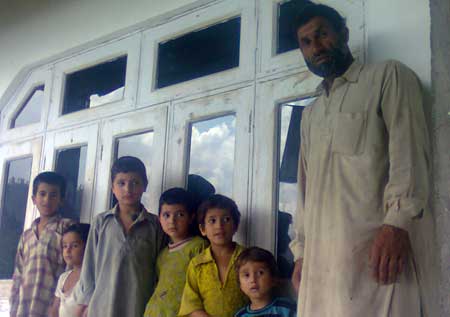Two Kashmiri youth recently returned home after spending 10 prime years of their lives behind bars. Convicted by a court in Uttar Pradesh for carrying explosives, they claim they were framed and didn’t get a good lawyer to fight their case, ABID RASHID BABA reports.

On a sunny June morning in 2002,days after he cleared his Class 10 examination, Mohammad Amin Peer told his mother that he wanted to leave Kashmir to pursue higher education in Islamic Studies.Despite getting good marks, he wanted to discontinue his schooling and study Quran at a private Darul Uloom in India’s northern state of Uttar Pradesh.
However, Peer had no idea of how to go about it.But his friend, Abdul Latif Tantray,told him that an acquaintance, who could help them get admission at Darul Uloom in Saharanpur.
Finally, in late June, they got enrolled in Darul Uloom in Gangoo village of Saharanpur. Everything was going well till one day when theywere purchasing vegetables from a market. It was on August 5, 2002, just two months after their arrival in Gangoo when the classes had just begun that the Uttar Pradesh police arrested them on ‘fake charges.’
“They asked us whether we were from Kashmir. Once we answered in affirmative, we were taken to a police station,” says Tantray. The charge sheet filed against them said the police arrested the duo from a market were they where trying to detonate a bomb.
The police had in its charge sheet said both the accused possessed RDX and a weapon. Later,the court of Judicial magistrate, Saharanpur, convicted them for their involvement in militancy activities and sentenced them for ten years.
After spending ten years in jail they returned home recently. On their arrival in their hometown, hundreds of people garlanded them amid pro-freedom slogans. Upon their arrival, the two were taken to Gund Brath village, the home of Tantray, in a large procession.
“When we were arrested by the police, we asked them what was our crime. They said you are Kashmiri and you have a beard. That is your crime! We were locked up and subjected to torture,”Tantray, who is 32 now says. “My world has changed after spending ten years inside the jail for a crime which we had never committed.”
“The Indian media branded us as terrorists. They said that we had come to Saharanpur so that we could launch attacks from this place. We didn’t know anything,. We were there just to study but no one listened to us at that time,” says Tantray.
Over the years of incarceration, Tantray has developed a hatred for media person and was reluctant to talk when this reporter met him. “Whenever Iseeany person-clicking picture,I get angry. Why didn’t any newspapers highlight our case for ten years so that we could get justice.”

Mohd Amin Peer, who also served 10 years in different jails in Uttar Pardesh, was shocked to see the condition of his family once he arrived at home. When he had left home for pursuing education, theirs was a middle class family. Today they live in abjectpoverty and desperation. “We sold our land, house and everything we had so that we could get our son out of the jail. But we couldn’t even do that.” said his brother,Nazeer Ahmad.
“When we were arrested, we were told to sign two documents written in Hindi. I couldn’t read it. We were told to sign on the papers and later we were produced before the court,”Tantray says.
After signing the papers, both were lodged inside a stinking room in a police station, “It was suffocating inside. We were tortured, our clothes were striped and we were left naked,”recalls Mohammad Amin.
Nazir Ahmad, Amin’s brother says that he was not able to provide education to his children after Amin’s arrest because whatever he earned, it was spent for fighting the case, “Despite that, I couldn’t get my brother out of jail for ten years.The miserable conditions led me to stop my two young daughters from pursuing education. I cried and told my daughters thatI was not in a position to afford their education,”Nazirtold Kashmir Life.
Nazir’s wife says they never celebrated Eidafter her brother-in-law was arrested. “This was the first Eid after ten years when we were together. During his incarceration, both parents of my husband died due to cardiac arrest,” she says.
For the first six months after his arrest, the parents of Amin were not allowed to meet him. They were only able to see him after a year. Now that the two are back to their normal lives, with the prime years of their lives spent behind bars, both feel cheated by the judicial system and the police who allegedly implicatedthem on false charges. “We didn’t had a good lawyer to fight our case,” Tantray says.















